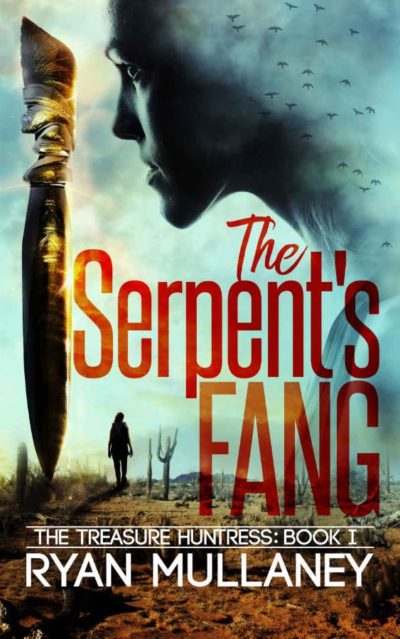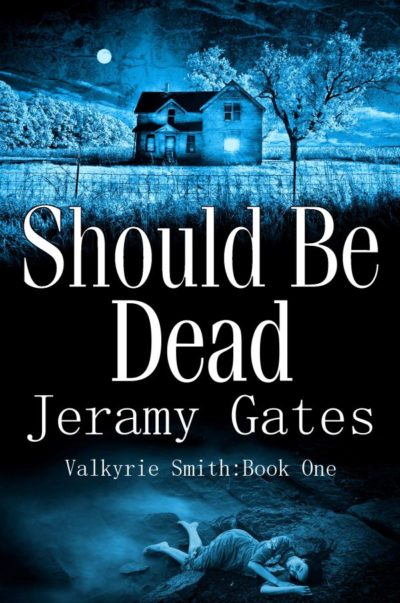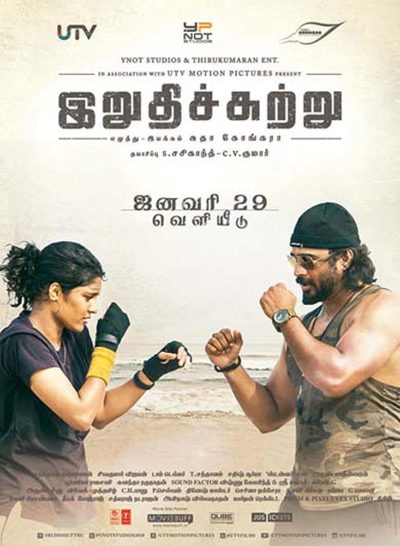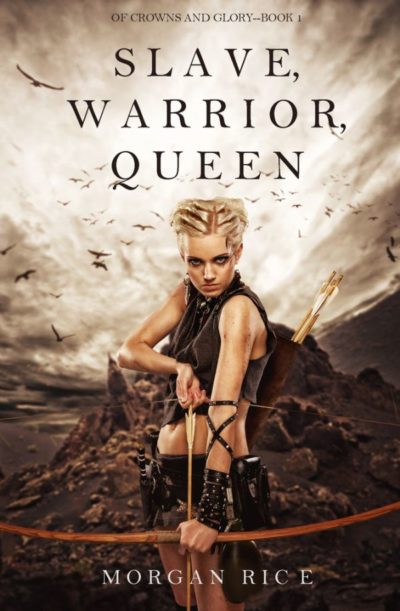★★★
“Not-so silent night”
 Not to be confused with RuPaul’s 2015 album (I kid you not), this starts off on shaky territory. I mean, a director who credits himself as “Spooky Dan Walker”, and three edgeladies as heroines, wannabe YouTube stars who think dropping F-bombs every second sentence is cool? I was thanking my lucky stars this had a running time of 76 minutes. This trio of urban explorers head off to an abandoned theme park in the middle of nowhere called Santa Land, only to find it not as abandoned as expected, with a giant horned monster, Grampus, roaming the area, operating as the devil’s Christmas ambassador to naughty children. Or adults, which is where Alexi (Klebe), Dahlia (Slaughter) and Sadie (Wagner) come on to its menu. Fortunately, Santa Land’s owner is there to help: who else but Mr. Claus (Bostwick) himself?
Not to be confused with RuPaul’s 2015 album (I kid you not), this starts off on shaky territory. I mean, a director who credits himself as “Spooky Dan Walker”, and three edgeladies as heroines, wannabe YouTube stars who think dropping F-bombs every second sentence is cool? I was thanking my lucky stars this had a running time of 76 minutes. This trio of urban explorers head off to an abandoned theme park in the middle of nowhere called Santa Land, only to find it not as abandoned as expected, with a giant horned monster, Grampus, roaming the area, operating as the devil’s Christmas ambassador to naughty children. Or adults, which is where Alexi (Klebe), Dahlia (Slaughter) and Sadie (Wagner) come on to its menu. Fortunately, Santa Land’s owner is there to help: who else but Mr. Claus (Bostwick) himself?
And that’s really where the film becomes considerably more fun. Because it plays fast and loose with the whole mythology of Christmas, depicting Santa as a hard-drinking, cursing biker who gave up the business because toys started being mass-produced. It’s a winning performance from Bostwick, who hand-waves away the girls’ questions about how he operated with increasingly irritated dismissals of “Magic!” This irascible charm seems to rub off on the heroines, who shift from irritating to endearing, and develop distinct personalities beyond their colour co-ordinated outfits and wigs, as they buckle down to fight Grampus and save… Well, less Christmas, and more the world in general.
It becomes increasingly self-aware as it goes on, poking as much fun at the world of Internet “celebrities” as endorsing it, e.g. the trio insist on taking selfies with the temporarily captured monster. There’s good support from Richard Moll as a local cop, and in particular, Diane Salinger as a local barmaid, who ends up playing a pivotal role, despite (or, more likely, because of) her clear aversion to the festive season. It all ends in a quite unexpected fashion which, if a bit too abrupt, fits nicely in with the slaying of sacred cows – or sleighing of sacred reindeer, perhaps – which has gone before. It certainly seals the three heroines as the pro-active leaders of the film, despite a shaky section in the middle where it looked like a boyfriend was going to end up saving the day. Not so fast, white knight…
I have to say, the Grampus suit itself is incredibly well done, a latex marvel that must have been hell to apply and perform in. While there are some elements which feel under-developed, such as the Ghoulies-like fur-balls which attack in act three, Walker keeps things moving at a brisk enough pace to get away with it most of the time. If not quite the silliest festive film which I’ve seen this year (that would, of course, be Santa Jaws), this deserves to be filed alongside other anti-Christmas movies, such as Gremlins. It’s no Die Hard, of course; then again, who is?
Dir: Dan Walker
Star: Kristina Klebe, Susan Slaughter, Hannah Wagner, Barry Bostwick





 This book comes with a fairly lengthy note at the end, in which the author explains how he came to the idea here. Five words are all that were necessary: “I ripped off Lara Croft.” Because this is the closest I’ve yet seen to the literary version of an Asylum mockbuster movie, such as
This book comes with a fairly lengthy note at the end, in which the author explains how he came to the idea here. Five words are all that were necessary: “I ripped off Lara Croft.” Because this is the closest I’ve yet seen to the literary version of an Asylum mockbuster movie, such as  A breezy yet slightly odd mix of comedy and ultra-violence, this drops Audrey (Kunis) and her gal pal Morgan (McKinnon) into the middle of a spy caper, after Audrey’s boyfriend Drew (Theroux) dumps her, only for Audrey to discover he was a CIA spy. He tells her she must deliver a statuette to a Viennese cafe, or the world will be in great peril. After the peril rapidly arrives, heavily-armed, she and Morgan head off to Europe, with no idea of who they can trust. In hot pursuit – whether for reasons good or bad – are MI6 agent Sebastian Henshaw (Heughan), and the agents of “Highland”, a criminal syndicate also very keen to get their hands on the statuette and what it contains. A whirlwind tour of European cities follows, including Budapest, Paris, Amsterdam and Berlin.
A breezy yet slightly odd mix of comedy and ultra-violence, this drops Audrey (Kunis) and her gal pal Morgan (McKinnon) into the middle of a spy caper, after Audrey’s boyfriend Drew (Theroux) dumps her, only for Audrey to discover he was a CIA spy. He tells her she must deliver a statuette to a Viennese cafe, or the world will be in great peril. After the peril rapidly arrives, heavily-armed, she and Morgan head off to Europe, with no idea of who they can trust. In hot pursuit – whether for reasons good or bad – are MI6 agent Sebastian Henshaw (Heughan), and the agents of “Highland”, a criminal syndicate also very keen to get their hands on the statuette and what it contains. A whirlwind tour of European cities follows, including Budapest, Paris, Amsterdam and Berlin. “In this world, you are nobody unless you can wield a sword, and I will not be nobody! My life will count for something!”
“In this world, you are nobody unless you can wield a sword, and I will not be nobody! My life will count for something!” From the director of
From the director of  “Liberation, Val had learned, was not a simple matter of casting off stereotypes and social conventions. Nor was it a mere change in perspective. Rather, it was an evolution in state of being, a release not from consequences, but from fear.”
“Liberation, Val had learned, was not a simple matter of casting off stereotypes and social conventions. Nor was it a mere change in perspective. Rather, it was an evolution in state of being, a release not from consequences, but from fear.” Despite thrashing virtually every sports cliché under the sun into the ground, this just about manages to skate by on the energy of its two central performances. Adi Tomar (Madhavan) is a boxing coach who gets hit with a trumped-up #MeToo charge by the head of the boxing association Dev Khatri (Hussain), and punted off to the backwoods of Chennai. There, however, he finds a raw jewel in Madhi (Singh), a fish-seller whose sister, Lakshmi (Sorcar), has been training as boxer with an eye to joining the police. But it’s Madhi’s aggression which attracts Adi’s attention, and he eventually convinces her to strap on the gloves.
Despite thrashing virtually every sports cliché under the sun into the ground, this just about manages to skate by on the energy of its two central performances. Adi Tomar (Madhavan) is a boxing coach who gets hit with a trumped-up #MeToo charge by the head of the boxing association Dev Khatri (Hussain), and punted off to the backwoods of Chennai. There, however, he finds a raw jewel in Madhi (Singh), a fish-seller whose sister, Lakshmi (Sorcar), has been training as boxer with an eye to joining the police. But it’s Madhi’s aggression which attracts Adi’s attention, and he eventually convinces her to strap on the gloves. author is certainly prolific: this series, Of Crowns and Glory is eight books, yet only her
author is certainly prolific: this series, Of Crowns and Glory is eight books, yet only her  Playing somewhat like a more brutal version of Fatal Attraction, this sees Ray (Norlén) help out the girl next door, Tara (Dickinson) with some heavy suitcases she’s trying to move into her car. From this eventually stems a one-night stand between the pair, made all the more unfortunate by Ray’s girlfriend, Maddy (Wehrle) being stranded by the side of the road with a flat, while the pair do the dirty deed. Ray then discovers Tara’s darker side: and when I say “darker side”, I mean she makes Alex Forrest of Fatal Attraction look like a bunny-boiling beginner. With the aid of a condom from their dangerous liaison, she frames him for the rape/murder of his boss, forcing him to help her get rid of the body. And Tara is only getting warmed up. Wait until she gets her hands on Maddy…
Playing somewhat like a more brutal version of Fatal Attraction, this sees Ray (Norlén) help out the girl next door, Tara (Dickinson) with some heavy suitcases she’s trying to move into her car. From this eventually stems a one-night stand between the pair, made all the more unfortunate by Ray’s girlfriend, Maddy (Wehrle) being stranded by the side of the road with a flat, while the pair do the dirty deed. Ray then discovers Tara’s darker side: and when I say “darker side”, I mean she makes Alex Forrest of Fatal Attraction look like a bunny-boiling beginner. With the aid of a condom from their dangerous liaison, she frames him for the rape/murder of his boss, forcing him to help her get rid of the body. And Tara is only getting warmed up. Wait until she gets her hands on Maddy… The 16-part series proved an unexpected sleeper hit in its native land, more than doubling the audience from debut to finale. This is all over the place in terms of genre, with comedy, thriller, romance and action threads. While they aren’t equally successful, it does a pretty decent job of managing most of them, and is surprisingly accessible for a Western audience. The heroine is Do Bong-soon (Park B-Y), the latest in a matriarchal line of very strong women. She has been brought up to keep her power suppressed, due to the potential issues it can cause; Bong-soon has also been warned that if she misuses them, and hurts an undeserving person, they will go away. [Let’s not worry too much about how this presents an easy solution: slap one innocent, and she would become just like everyone else…]
The 16-part series proved an unexpected sleeper hit in its native land, more than doubling the audience from debut to finale. This is all over the place in terms of genre, with comedy, thriller, romance and action threads. While they aren’t equally successful, it does a pretty decent job of managing most of them, and is surprisingly accessible for a Western audience. The heroine is Do Bong-soon (Park B-Y), the latest in a matriarchal line of very strong women. She has been brought up to keep her power suppressed, due to the potential issues it can cause; Bong-soon has also been warned that if she misuses them, and hurts an undeserving person, they will go away. [Let’s not worry too much about how this presents an easy solution: slap one innocent, and she would become just like everyone else…]